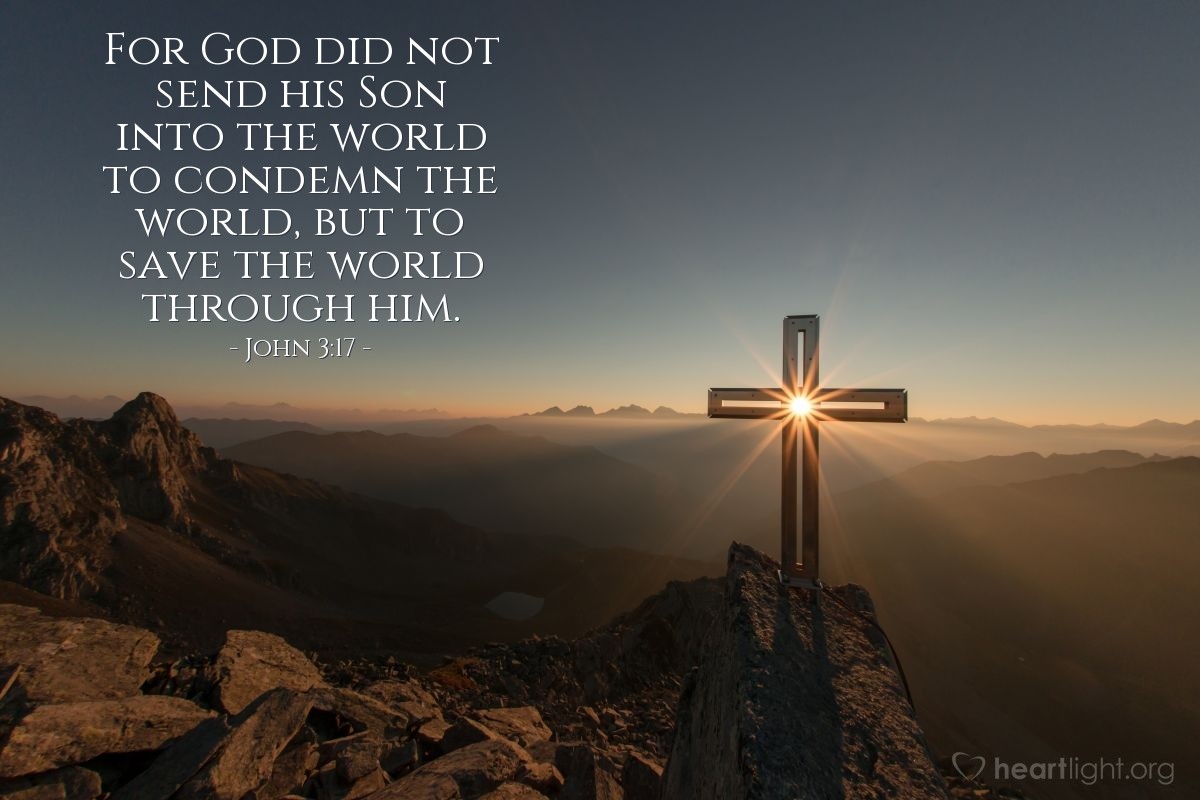For God so loved the world that he gave his one and only Son, that whoever believes in him shall not perish but have eternal life (John 3:16).
Verse 16 is mentioned in signs just about everywhere — sporting events, concerts, races, rodeos, and even political rallies. Why not include verse 17?
Many of us learned to quote verse 16 from an early age. Why not also learn verse 17?
For many people, verse 16 is the most beloved verse of the Bible. Why not also verse 17?
In invitations to respond to Christ or in altar calls, the preacher often quotes verse 16. Why leave out verse 17?
The two verses make up one thought. They emphasize the importance of Jesus' sacrifice on the cross being rooted in the love of God and his desire to save the world through Jesus. God didn't hate the world. God didn't want to destroy the world. God sent Jesus into the world to save it, not condemn it:
For God did not send his Son into the world to condemn the world, but to save the world through him (John 3:17).
The world was not Jesus' enemy. In fact, Jesus sacrificed himself to save the world from the tyranny of the evil one and his grip on the hearts of men and women through their fear of death (Hebrews 2:14-18). Jesus came to redeem the people of the world and buy their freedom from sin, death, and hell. Jesus came to reconcile the people of the world back to God and unto himself.
So, why leave out verse 17?
Doesn't our work among the people of the world lose passion and focus without verse 17?
Don't we reduce our view of how precious the people of the world are to God by leaving off verse 17?
Don't we lose something vital about the message of salvation when we forget Jesus' reason in coming was to save the world? Don't we have a more hostile approach to the world when we forget that God sent Jesus to save it, not condemn it?
Seems to me that we end up with a meaner message when we forget verse 17. Without verse 17, we easily forget that Jesus didn't come to condemn the world, he came to save it. In fact, the people Jesus condemned were those who had turned faith into religious ceremonies, rules, privileges, and power. Without verse 17, we can slip into viewing the world as our enemy instead of the place where we demonstrate Jesus' grace. Without verse 17, we too easily begin to see the people of the world as our enemies rather than the place we share Jesus' love.
Shouldn't we remember verse 17?
Shouldn't we see the unredeemed, unbelieving, and unrepentant people of our world as the destination of Jesus' grace and our love?
God loved the world so much that he gave his Son. He didn't do it to condemn the world, blame the world, shame the world, or to escape the world. God sent Jesus to save the world. And just as the Father sent Jesus to show his love for the world, so Jesus is now also sending us:
On the evening of that first day of the week, when the disciples were together, with the doors locked for fear of the Jewish leaders, Jesus came and stood among them and said, "Peace be with you!" After he said this, he showed them his hands and side. The disciples were overjoyed when they saw the Lord.Again Jesus said, "Peace be with you! As the Father has sent me, I am sending you" (John 20:19-21).
As we go on this mission to be Jesus to the world, let's not forget verse 17!











Reader Comments
Archived Facebook Comments